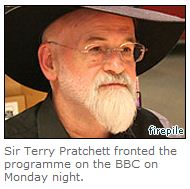 Websites
Websites
|
|
|
|
|
BBC 'Suicide' programme one-sided
The BBC is facing a storm of controversy after it aired Sir Terry Pratchett’s “very unbalanced” documentary on assisted suicide last night.
by the Christian Institute
 The BBC has received hundreds of complaints about the programme, Choosing to Die, which went out on BBC2 at 9pm. The BBC has received hundreds of complaints about the programme, Choosing to Die, which went out on BBC2 at 9pm.
And critics, including the Bishop of Exeter, spoke out against the programme amid an accusation that it was “one-sided”.
Living
The Bishop of Exeter, the Rt Revd Michael Langrish, said: “I want to see much more emphasis put on supporting people in living, than assisting them in dying.”
He also added that the law in Britain “remains clear and is there to protect the vulnerable”.
Peter Saunders, from the Care Not Killing Alliance warned: “We felt the programme was very unbalanced and one-sided and did not put the counter-arguments.”
He also cautioned that the programme “breached just about all the international and national guidelines on portrayal of suicide by the media” and said the Alliance was “very worried about the danger of copycat suicide or suicide contagion”.
Prefab
Liz Carr, a disability campaigner, said: “I, and many other disabled older and terminally ill people, are quite fearful of what legalising assisted suicide would do and mean”.
The programme showed Sir Terry Pratchett following Peter Smedley, a motor neurone disease sufferer, to a Swiss suicide clinic.
Reviewing the programme in The Guardian newspaper, Sam Wollaston described the clinic, which is operated by Dignitas, as: “Not a lovely chalet in the mountains, with meadows and edelweiss and the sound of cowbells, as you might hope for; but a strange blue prefab on a Zurich industrial site.”
Writing in The Herald newspaper, reviewer Mark Smith hit out at Dignitas saying: “I couldn’t help my shock at times and I have to admit my anger: Sign here please and we will kill you.”
Emotive
The BBC denied it was biased on the issue and a spokesman said the programme was “giving people the chance to make their own minds up on the issue”.
A Ministry of Justice spokesman said: “The Government believes that any change to the law in this emotive and contentious area is an issue of individual conscience and a matter for Parliament to decide rather than Government policy.”
|
The Editor, 15/06/2011
|
|
|
|